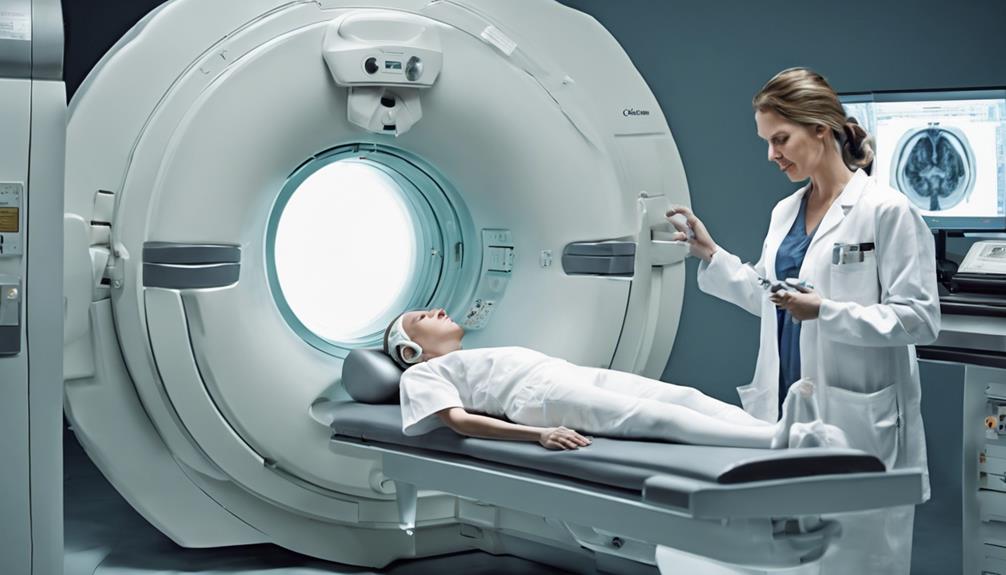Do you understand the important factors to keep in mind for safely undergoing MRI scans with cochlear implants? Having knowledge about the required precautions and protocols can significantly impact the results.
Ensuring the compatibility of your cochlear implant with varying MRI strengths is crucial, but what about the potential challenges posed by higher strength MRIs?
Stay tuned to discover the necessary guidelines and expert advice to navigate this intricate yet vital aspect of cochlear implant care.
Key Takeaways
- Consider angle between MRI field and implant magnet for safety.
- Ensure communication with healthcare providers for guidance.
- Monitor and maintain cochlear implant functionality through optimal settings.
- Adhere to safe practices during MRI scans, prioritizing patient safety.

MelonArt Kids Ear Protection Ear Muffs Noise Cancelling Headphones for Kid Toddler Adult Autism Sensory, 27dB Noise Reduction Earmuffs Hearing Safety for Shooting Monster Truck Concert Fireworks
Professional-Grade Safety for Sensitive Ears: Designed with high-density acoustic sponge and solid ABS cups, kids noise cancelling headphones...
As an affiliate, we earn on qualifying purchases.
Understanding MRI Safety Precautions
To ensure safe MRI scans with cochlear implants, understanding the importance of specific safety precautions is paramount. When undergoing an MRI with a cochlear implant, it's crucial to consider the angle between the MRI magnetic field and the implant magnet, ensuring it stays below 90° to prevent any dislocation or discomfort.
The magnetic field's critical zone begins 30 cm from the entrance, highlighting the significance of proper positioning throughout the scan to avoid any interference with the implant. Consulting the implant manufacturer for compatibility and adhering to their special instructions are essential steps in guaranteeing a safe MRI experience.
Utilizing arrow drawings to indicate the magnetic field orientation concerning the implant can aid in aligning it correctly during the procedure. Experienced physicians also play a vital role in overseeing the process, helping to prevent any iatrogenic complications that may arise during MRI scans with cochlear implants.

Dr.meter Noise Cancelling Headphones For Kids 2PACK, 27.4SNR Kids Ear Protection Ear Muffs for Toddler Hearing Protection, Noise Reduction Earmuffs for Fireworks, Monster Jam, Autism Sensory, Focus
【Extremely Comfortable to Wear】: Wrap your child's ears in cloud-like softness! Dr.meter noise cancelling headphone is made of...
As an affiliate, we earn on qualifying purchases.
Communication With Healthcare Providers

When discussing your cochlear implant and the specific MRI safety guidelines with healthcare providers, clear communication is crucial to ensure a safe and successful scan. It's essential to inform your healthcare team about the type of cochlear implant you have and any relevant medical history. Seek guidance on the necessary precautions to take before, during, and after the MRI scan with a cochlear implant. Ensure clear communication with your ENT physician and the radiology team regarding your implant and the MRI procedure. Follow the recommendations provided by your healthcare professionals to safely undergo an MRI scan with your cochlear implant.
- Inform healthcare team about cochlear implant type and medical history.
- Seek guidance on precautions before, during, and after MRI scan.
- Communicate clearly with ENT physician and radiology team.
- Follow healthcare professionals' recommendations for safe MRI scan.

Dr.meter Ear Muffs for Noise Reduction: 27.4SNR Noise Cancelling Headphones for Kids Adults, EM100 Adjustable Hearing Protection Earmuffs for Monster Jam, Autism Sensory, Concerts, Fireworks
【Extremely Comfortable to Wear】: Wrap your child's ears in cloud-like softness! Dr.meter noise cancelling headphone is made of...
As an affiliate, we earn on qualifying purchases.
Ensuring Functionality of Cochlear Implants
Regular mapping and testing of cochlear implants are essential steps in ensuring their functionality before and after undergoing an MRI scan. Working closely with an audiologist to monitor the implant settings and conducting regular testing can help maintain optimal performance. To illustrate the importance of these actions, we have provided a table below outlining key considerations for ensuring the functionality of cochlear implants during MRI scans:
| Consideration | Description |
|---|---|
| Audiologist Consultation | Seek guidance on optimizing implant settings pre and post-MRI. |
| Monitoring Sound Perception | Stay vigilant for any changes in sound perception or implant performance. |
| Following MRI Guidelines | Adhere to safety protocols such as proper positioning and magnet precautions. |

Dr.meter Noise Reduction Ear Muffs, Noise Cancelling Headphones for Adults, Kids Autism Sensory Ear Protection Earmuffs, 31dB Hearing Protection for Shooting Gun Range, Mowing, Fireworks, Concerts
【Comfort and Snug】: Say goodbye to bulky earmuffs! Dr.meter noise cancelling headphones are made of premium memory foam...
As an affiliate, we earn on qualifying purchases.
Navigating Magnetic Field Challenges

Ensuring the safety and efficacy of MRI scans with cochlear implants involves skillfully navigating the challenges posed by magnetic fields to protect patient well-being and implant functionality.
When faced with magnetic field challenges during MRI scans, there are crucial steps to take:
- Angle Optimization: The angle between the MRI magnetic field and the cochlear implant magnet should be less than 90° to minimize risks.
- Critical Zone Awareness: The critical zone of the magnetic field begins 30 cm from the entrance of the MRI machine, necessitating careful positioning.
- Supine Position: Patients must maintain a supine head position without any inclination during the MRI scan to ensure safety.
- Manufacturer Guidance: Consult the manufacturer for specific implant compatibility information and adhere to any special instructions provided.
- Physician Expertise: Experienced physicians play a vital role in preventing iatrogenic complications during MRI scans with cochlear implants.
Safe Practices During MRI Scans
To ensure the safe conduct of MRI scans for individuals with cochlear implants, it's essential to adhere meticulously to established safety protocols and guidelines. MRI safety is paramount when dealing with cochlear implants due to the presence of the implant magnet, which can interact with the MRI's magnetic field.
Patient positioning is crucial to prevent iatrogenic complications. Maintaining a supine head position during the MRI scan is vital as any inclination can increase the risk of adverse effects. Consulting the implant manufacturer for specific compatibility information and following their guidelines is imperative to ensure the safety of the patient.
Additionally, having experienced physicians oversee the MRI scan is vital in detecting and preventing any potential issues that may arise. By following these safe practices, individuals with cochlear implants can undergo MRI scans with confidence, knowing that their well-being is prioritized throughout the imaging process.
Frequently Asked Questions
How Do People With Implants Get an Mri?
We understand the concern about how people with implants get an MRI. It's important to ensure the safety and compatibility of the implant with MRI scanners. Consulting healthcare providers and the implant manufacturer is crucial to determine if an MRI is safe.
Following specific guidelines, like removing the sound processor, before entering the scanner is essential. Radiologists must be informed of the implant type for a successful and safe scan.
When Did Cochlear Implants Become MRI Safe?
We've seen a significant advancement in cochlear implant technology over the years. Models like the MED-EL SYNCHRONY have made MRI scans safer for recipients, allowing scans up to 3.0 Tesla without requiring magnet removal.
This innovation has brought peace of mind to many, knowing they can undergo MRI scans without surgery or downtime. The evolution of MRI safety for cochlear implants has truly been remarkable.
What Must I Avoid Now I Have a Cochlear Implant?
We must be mindful of avoiding strong magnetic fields with a cochlear implant. It's crucial to steer clear of metal objects near the implant to prevent magnetic interference.
Prior to an MRI, it's important to remove the audio processor to prevent any potential damage. Informing the MRI technician about the cochlear implant is essential to ensure the necessary precautions are taken for a safe scan.
Following manufacturer guidelines is vital for a successful MRI experience.
Are Titanium Cochlear Implants Safe for Mri?
Yes, titanium cochlear implants are safe for MRI scans. They're made of non-magnetic titanium, eliminating the risk of interference with the MRI machine. The absence of ferromagnetic materials ensures compatibility and safety during the procedure.
Patients with these implants can undergo MRI scans without needing the magnet removed. This feature makes titanium cochlear implants a reliable choice for individuals needing MRI scans while ensuring their safety and well-being.
Conclusion
In conclusion, ensuring the safety of MRI scans with cochlear implants is essential for optimal health outcomes. By following guidelines, communicating with healthcare providers, and addressing any challenges, individuals can confidently navigate the MRI process.
Imagine the peace of mind knowing your cochlear implant is protected during the scan, allowing you to focus on your health and well-being. Trust in the expertise of your healthcare team to guide you through this important journey.










